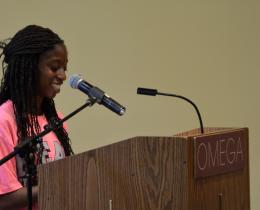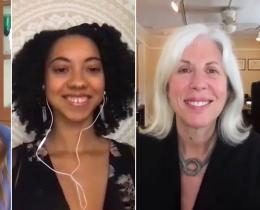Omega: What advice do you have for people who are nervous about public speaking?
Barbara: Fear of public speaking is the number one fear that people, both men and women, in the U.S have. It's higher on the list than fear of death. So, realize this fear is universal. It's not like there's something wrong with you.
The second thing is that few people will notice that you’re nervous. We think that everyone knows that we're nervous. It may be true that the people who know us well observe us more carefully than other people do. They know when we're tired, they know when we're angry, they know when we're maybe feeling a little fearful or uncomfortable. But otherwise few people will notice.
The most effective thing you can do to overcome nerves is to re-label your nervousness as a good thing rather than a bad thing. There was a study done out of Harvard Business School that looked at this fear. The researcher who conducted the study, Alison Wood Brooks, sang in an a capella group, and she noticed that every semester women would audition and everyone was nervous. Some did well with the audition despite the nerves and some didn't.
She set out later to investigate this. There are two things she noticed. The first was the physiological changes: The heart begins to beat a little faster, sweat breaks out. The second is what she calls the valance. Is this nervousness positive or is it negative? She found that the people who succeed, both in singing and public speaking, are not the ones who say calm down, calm down, calm down. They don't try to change the physiological symptoms, they change the valance, or how they label the experience as positive or negative.
Rather than trying to dim it down, it's a question of channeling energy. If I were to run a race, I would be at the start waiting for the signal and when my heart beat faster, I would say to myself, “Great, I'm going to need the extra energy to win the race.”
However, when we get the same preparatory signals that we're going to do something a little different than is ordinary, as is the case with public speaking, we somehow try to put them away. I think we need to channel those signals. It's a question of how you interpret the body's physiological symptoms.
When all else fails, remember that no one knows what you meant to say. They never know what you left out. There are several studies that show audiences forget between 65 and 80 percent of what they hear almost immediately. Even if we torture ourselves with, “It wasn't perfect,” probably no one will remember very much anyway.
It's important to keep in mind that you may fixate on your behavior but not everyone else does.
Omega: You are a leader in the field of public speaking. Have you ever had any mishaps during a speaking engagement? How did you overcome them to keep going?
Barbara: Again, the first thing to realize is that no one knows what your speech was meant to be. You handle it in real time. And remember that the audience is on your side. Somehow we always assume the audience is out to get us. When people are really out to get us, they rarely invite us to speak. The audience wants to come away saying I heard the best speech, or I learned something important. The audience wants us to succeed. If we look like we can handle whatever it is that's going on, they're always on our side.
Let me give you an example. I was the keynote speaker at a conference. There was a long table I was behind, and there was a pitcher of water. I knocked the pitcher of water and my notecards onto the floor. To make matters worse, I had written my notes in fountain pen.
I'm now seeing my words swimming before me. I reach over, I pick up the cards, and I shake them out. They're that wet. I slap them down on the table. I look at the audience and I say, “After this beginning, the rest is going to be easy.” And I just hear them sigh in relief. Because if I'm angry at myself, it feels to the audience as if I'm angry with them.
In my most recent example, I was working for one of the premiere consulting firms in the world. It was my first time with them, and I had to do four lectures that day. In a hurry, I accidentally packed two boots that were different from each other. One suede, one leather. One heel, one flat. The good news is that one was right, one was left. I don't know what I would have done otherwise. I've got on black pants, black socks, and two different black shoes.
"What am I going to do?" I asked myself.
“Barbara, you are going to do whatever you do with the greatest of confidence,” I answered.
They lead me to an office, and I can hear myself walking down the hall because I'm making a clunk clonk, clunk clonk sound, right? It's kind of a riot. I did four lectures, and at the end of the day I met individually with members of the audience.
No one noticed. Not one of them. You just have to behave with confidence. Because people want you to succeed. If I had let the shoes bother me, it would have taken power from those lectures and meetings.



